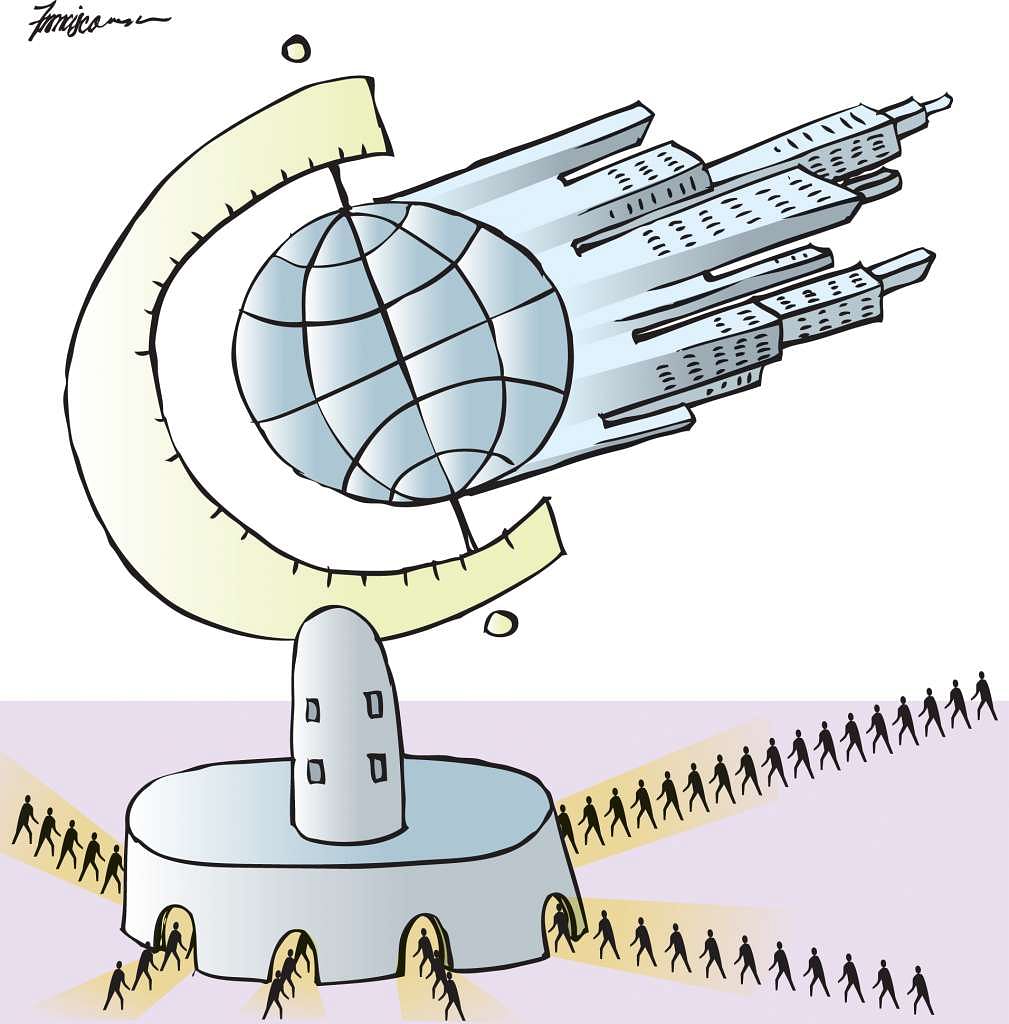People often think that globalisation means that things must be at a global scale, and that anything below the global level is diminished in importance.
This stems from a wrong understanding of globalisation.
As I explained in my book The Global City (1991), globalisation has made the sub-national level more important.

In the past era when nation-states were in ascendance, nations mattered. Territorial mass and scale were important. As globalisation expanded, more countries generated what is the ultimate bridge into the global economy - global cities. Today, there are millions of cities, but about 100 of what I would consider global cities.
Global cities, not nation-states, are now the key nodes of global operational space for both economic and cultural processes.
What this means is that in a global world, one need not be a nation-state to exert influence. Cities and city-states get to play new, vital roles, no matter how little land they have.
Among the 100 global cities, I consider three to be of supreme importance: Singapore, Dubai and Hong Kong.
Few cities have achieved Singapore's strength as a key node and actor in a vast transnational operational space. Dubai is the other major global city-state today. Hong Kong has a special status within China. Hong Kong has historically been a quasi city-state, even if never fully autonomous, whether from Britain or China. It operates at another scale from Dubai and Singapore. It has a much longer history and has long been the intermediary between China and the world and the world and China.
Neither Dubai nor Singapore has this function. That makes these two even more impressive as they lacked the massiveness of a vast national economy behind them.
Both Singapore and Dubai can compensate for the lack of a massive national economy because they are both major ports. By major here, I mean not just size, but their key roles in developing and exporting a knowledge economy of how to manage and run ports.
So influential was Dubai's port administration that, shortly after the Sept 11, 2001 attacks, the Bush Administration in the United States, at one point, suggested contracting Dubai ports to manage the security of US ports. The idea was dropped when nationalist legislators in the US raised a clamour against it, but it illustrates the scope of Dubai's expertise.
With China moving towards becoming the major power in Asia and beyond, including the building of (artificial) islands to mark its power over an ocean, I envisage that Singapore and Dubai will both expand this global role in foreign ports management.
As a global city, Dubai is advancing in one area that is slightly dubious: Dubai's diverse spaces are all increasingly beginning to resemble shopping malls. This is impressive but, perhaps, undesirable in the long run. Luckily, Dubai's supermall status is not something Singapore seems keen to emulate.
CHANGING FINANCIAL CENTRE ROLE
Singapore has a key strategic financial function that Dubai does not quite have. In both cases, it is clear that the financial function is undergoing change. Dubai may eventually emerge as a leading Islamic financial centre.
In the case of Singapore, it may have lost its once almost unique status as the financial centre used by those wanting to invest in other parts of its South-east Asian hinterland. These days, investors go straight to Malaysia or Thailand, bypassing Singapore.
It now takes a mix of sectors and firms to be a major financial centre.
What global cities, such as Singapore and Hong Kong, have when it comes to finance is the capacity to be centres of production - in this case, production of financial instruments. At the very least, they have the capacity to specialise in particular sectors.
I have long been interested in bringing to the fore the variety of specialised financial centres in the global system. The leading financial centres have developed multiple specialised capacities - they cover a very broad range of financial sectors and circuits.
And yet, even here we see specialised advantages: Each dominates particular sectors where they excel and are global leaders.
New York is different from Chicago, and both of these are different from London, Hong Kong and Tokyo, and so are Frankfurt and Paris. I will leave it to Singapore's experts to establish where it dominates.
LIVE IN SINGAPORE, WORK ELSEWHERE
When it comes to liveability and strategic positioning, Singapore has, over the last few years, become far more significant as a city where people want to live in, even when their work is not necessarily in Singapore.
That makes Singapore a residential platform for people whose work space stretches well beyond.
Dubai is the ultimate residential platform in its region - with a growing number of people who work in India actually making their home in Dubai. This is a function that may become increasingly important for a certain type of city, such as Hong Kong, for example, for those who work on the mainland. In the West, this is something far less likely to happen in a city such as New York or Paris, and far more likely for Monaco and Zurich.
Under these conditions, a city's size is a curve: Expanding as it rises, topping off in terms of "desirable" capacity and then, if it does not handle things well, possibly declining in attractiveness.
Singapore is, right now, still rising in its attractiveness as a site for basing oneself, even if one's work is in another country.
Residential internationalism is a very specific type of internationalism and many global cities do not quite make it.
There was a famous (or infamous?) study done by a consulting firm about Sao Paulo.
It asked top-level foreign employees if they were happy living in Sao Paulo or would rather move to another Latin American city. The answer was overwhelming: A majority would rather have their business relocate to Buenos Aires so they could live there.
The problem was that Sao Paulo was by far the more powerful global city - thus the firms could not afford to leave; this may now be changing.
Few, if any, of those working in Singapore would say they would rather live in a city other than Singapore.
RISING INEQUALITY
However, one trend all these great cities share is growing social inequality, something I already detected as an emergent trend 25 years ago in The Global City.
It is a polarisation built into the tissue of these cities. It takes special attention because it is the state of nature in these cities, not something that went wrong. Cities have always been marked by inequality.
One aspect today is scaling: The upgrading of the rich neighbourhoods is extraordinary, with bigger and bigger houses and gardens, where before there might have been only a few. Display has becoming something present in all these cities, where before it was a bit of the opposite - a discreet elegance, not showing off.
GLOBAL CIRCUITS A KEY SPARK
What marks the three global cities of Singapore, Dubai and Hong Kong is that they operate in a very broad and diverse set of global circuits. And, in my analysis, that is the key. For instance, just considering the Emirates, Abu Dhabi is far richer than Dubai, but it lacks that multiplicity and diversity of circuits that Dubai has. Further, even as it is trying hard to address that, there seems to be room for only one "Dubai" in the Emirates.
The Emirates' other cities will gain by following a different pathway: Developing their own specialised differences beyond what is standard in all cities.
Thus, Sharjah has found its niche in global education circuits and its arts and culture Biennial. None of the other Emirates can compete with Sharjah on this. Sharjah is the cultural capital of the Emirates, with a global presence that reaches to The New Yorker magazine, to mention one almost quaint vector.
Similar dynamics, even if with radically different contents, can be detected in the relative positioning of a growing number of cities in Asia.
Take Wuhan in China, which is as large as Hong Kong and has far more room to expand. It is the latest darling of the Chinese government, which has declared it the country's logistics centre.
It also has the largest water resources in China. It is probably the case that the Chinese government would like to see Wuhan rise and Hong Kong lose a bit (just a bit) of its dominant position in the world. But Wuhan lacks the number and variety of Hong Kong's global circuits.
Wuhan, with help from Beijing, is working hard at developing them and, in a near future, may emerge as one of the major nodes that connects China to the world. But it is unlikely that it will replace Hong Kong.
MANY GLOBAL CITIES
The global world is not moving towards one super global city. That can, and has, happened with the geopolitics of national states, but not with global cities.
More generally, we will see a proliferation of globalising cities, mostly in Asia, some in Africa and some in Latin America.

But the major 20 global cities we can identify today, where Hong Kong and Singapore rank in the top 10, are unlikely to lose their standing over the next few decades. More deeply and structurally, what many commentators seem to miss is the fact that there is far less competition among global cities, and far more of the making of a distributed operational space where some firms prefer a certain type of global city, and others another.
What this tells us is that the specialised differences of global cities are a key variable.
These cities compete far less among themselves than seems to have been understood.
Global firms do not want one perfect super global city. They want many, because the global city is a sort of bridge into the specifics of national economies. The major global cities add to this the export of their specialised knowledge economies - notably port management and financial services.
In short, Singapore is here to stay as a global city, and so are Hong Kong and Dubai.
• Professor Saskia Sassen is a Dutch-American sociologist best known for her pioneering work on globalisation. She is Robert S. Lynd Professor of Sociology at Columbia University. In 2011, she was named one of Foreign Policy magazine's Top 100 global thinkers.
